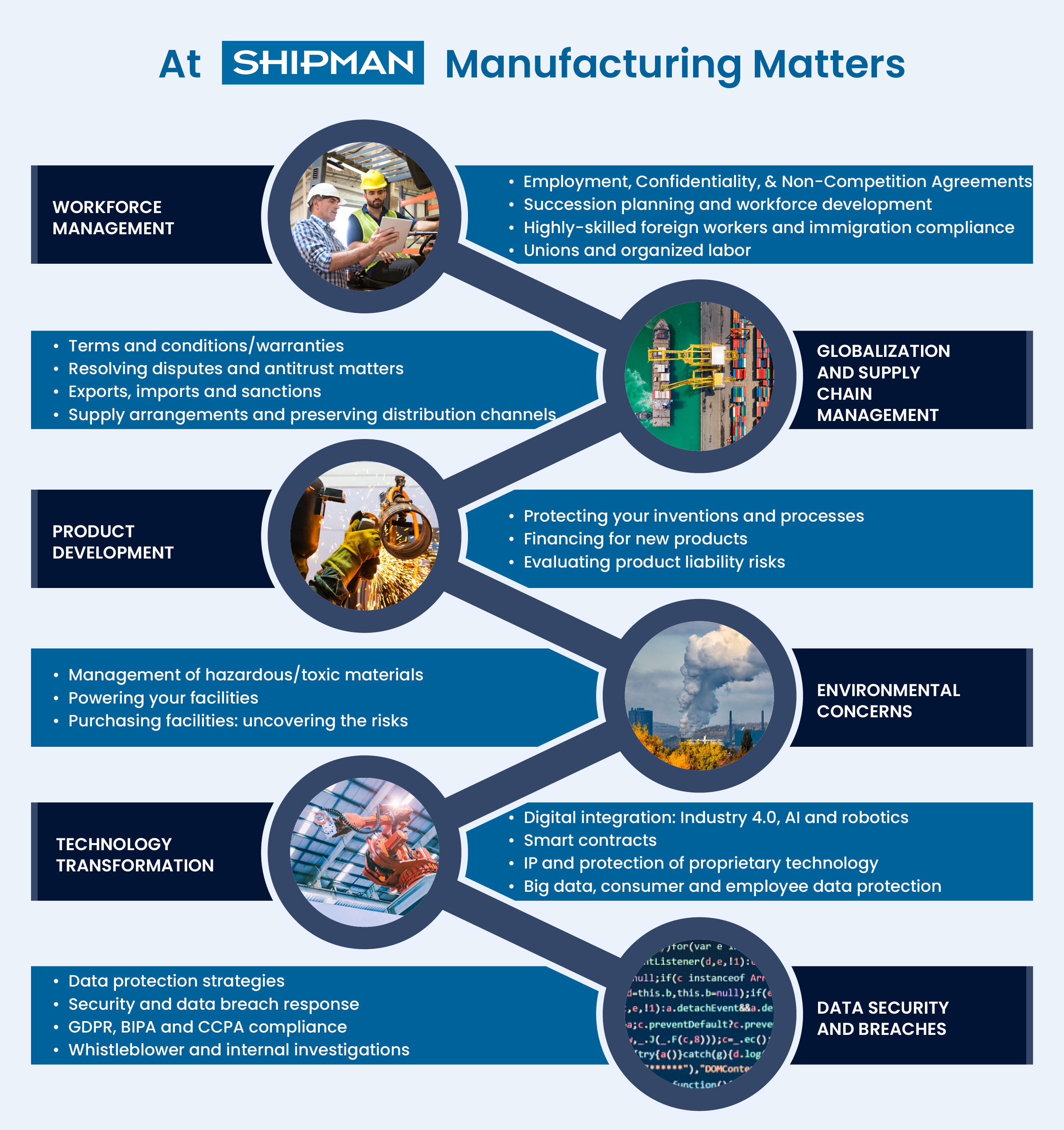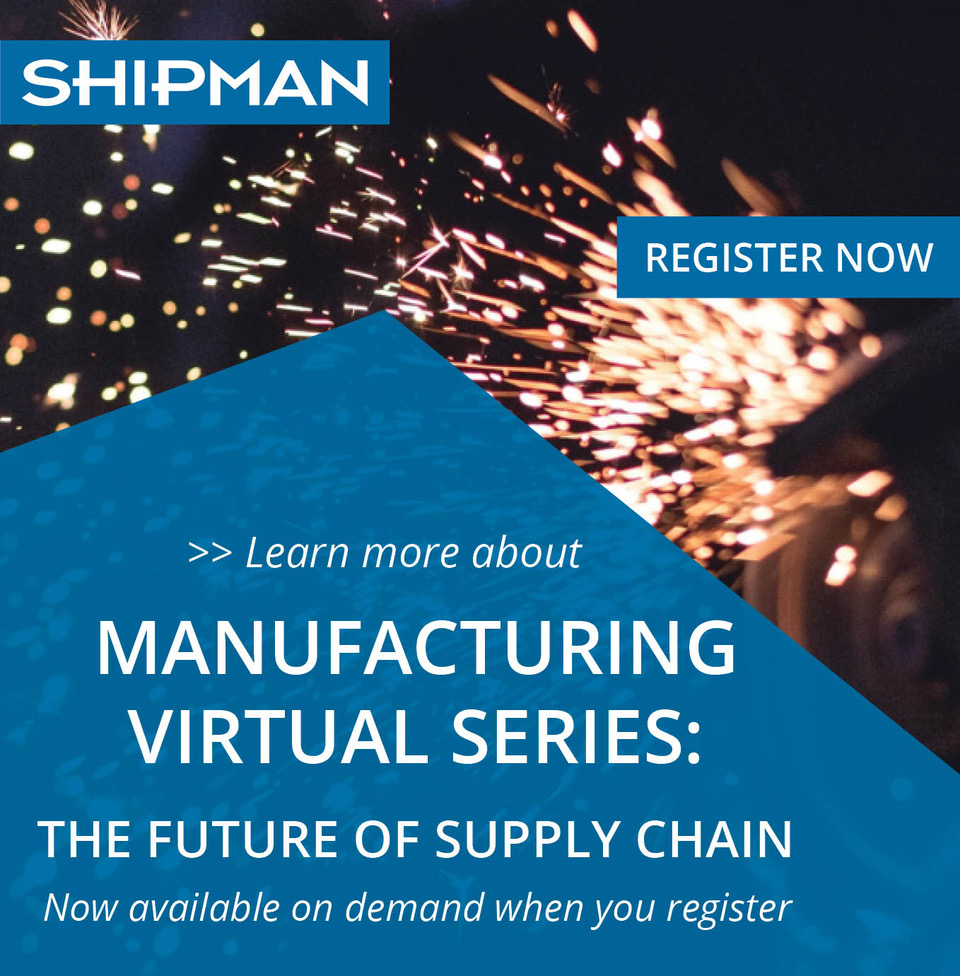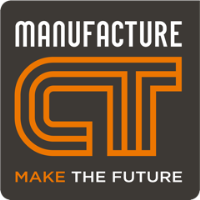Manufacturing

To succeed, manufacturers need foresight, innovation, and a network of cooperative relationships. At Shipman, manufacturing matters. We help business owners, investors, lenders and other parties seize opportunities, minimize risks and protect their investments in this always valuable — and increasingly vulnerable — sector. Our work is client-driven and issue-focused. With decades of legal and business experience working with manufacturers in our respective fields, we provide broad-based regulatory compliance counsel and focused, multidisciplinary guidance in rapidly developing areas of concern.
As manufacturing in the United States — and in Connecticut, in particular — experiences a renaissance, advanced manufacturers, additive manufacturers and aerospace manufacturers, as well as life sciences, technology-focused and other companies are embarking on an exciting period of growth. Through our collaboration with publicly traded and privately held corporate clients, educational institutions, and state and national manufacturing associations, Shipman is uniquely positioned to help businesses prosper, today and in the future.
Workforce Management
Today’s manufacturing workforce is evolving at a rapid pace and manufacturers across the United States are facing unique obstacles attracting and retaining highly skilled talent. Shipman collaborates with clients at every step of the employment process — and from the executive suite to the factory floor — to offer client-focused solutions to today’s workplace trends and challenges, including remote, foreign, contract, temporary and flex-time workers; a multi-generational workforce; and a hypercompetitive recruiting market.
Globalization and Supply Chain Management
Virtually all manufacturers operate in a complex, global network of vendors, suppliers, wholesalers, distributors, retailers, investors, lenders and regulators. Shipman delivers coordinated, multidisciplinary legal counsel that helps clients manage these relationships more effectively and respond to rapidly changing international trade laws. We help clients resolve conflicts with business partners (including financially distressed companies), vet suppliers and customers, protect intellectual property and trade secrets, comply with crossborder transactions, develop proactive business succession strategies, and ensure the timely movement of materials and products at every step in the supply chain.
Product Development
A manufacturer is only as good as its products. In today’s hypercompetitive marketplace, innovation is as important as quality, reliability and reputation. Shipman’s manufacturing lawyers have extensive experience helping clients identify, protect and monetize creative assets; negotiate contracts with vendors, suppliers, distributors and other parties along the entire supply chain; pursue cost-effective and tax-advantaged financing and grant strategies to support research and new-product development initiatives; and address product liability issues.
Environmental Concerns
For manufacturers, the environment is a daily, front-and-center issue. At every step in the supply, distribution and sales chain, businesses must ensure that effective safeguards are in place to avoid potential contamination, limit human exposure to known hazards, and ensure compliance with an ever-growing and increasingly complex list of local, state, federal and international regulations. For their part, developers, investors and lenders need to understand more than current or proposed manufacturing activities; they must also be aware of the history of the facilities and land upon which these processes take place and their own responsibilities and potential liabilities in connection with preventing or addressing the impact of manufacturing processes.
Technology Transformation
Industry 4.0 — also known as the fourth industrial revolution — is taking manufacturers to the next level in digital integration. Automated technology is now artificial intelligence (AI). Smart factories and robots act not only according to their programming, but are capable of self-diagnosis and self-correction. Connectivity, including the Internet of Things (IoT), is the order of the day rather than an interesting new feature. Shipman helps manufacturers take full advantage of these technologies to protect their market positions while minimizing the risks and challenges that arise from rapid adoption.
Data Security and Breaches
Data is a more valuable and powerful resource than ever — especially when it falls into the wrong hands. As the Internet of Things (IoT), biometric security tools, smart medical devices, GPS tracking systems and other powerful technologies become business as usual for companies large and small, hackers, cyberterrorists, industrial spies and other bad actors are likewise stepping up their efforts to obtain and benefit from proprietary and private information.
Regulations and Compliance
Manufacturing remains central to the global economy — and, as a result, takes center stage in the complex framework of international, federal, state and local regulations that govern businesses today. To help manufacturers more effectively identify, address and prevent potential compliance issues and resolve disputes with regulators and law-enforcement officials, Shipman draws on the experience of lawyers across all of our core practice areas.
Interlaw, Global Legal Network
Manufacturers of every size and ownership structure are deeply connected to the global economy. Whether purchasing raw materials or components from overseas vendors, selling to customers around the globe, establishing distribution hubs, or responding to geopolitical forces — such as trade and tariff disputes, Brexit, and rapidly changing regulatory policies — companies need access to experienced local counsel, with true local insights wherever their interests take them.




